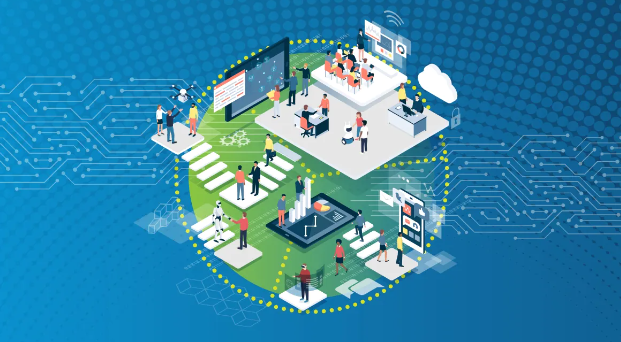Technology is shaping the future of work in profound ways, revolutionizing industries, job roles, and the way we approach employment. As we move further into the digital age, technology-driven changes are becoming increasingly evident. Here, we explore how technology is transforming the future of work:
1. Automation and Artificial Intelligence (AI):
Impact: Automation and AI are automating routine and repetitive tasks across various industries, from manufacturing and logistics to customer service and data analysis.
Effect: While some jobs may become obsolete, many new opportunities will emerge in areas like AI development, robotics maintenance, and data analytics. Workers will need to upskill to stay relevant.
2. Remote Work and Telecommuting:
Impact: Advancements in communication technology have enabled remote work on a global scale. The COVID-19 pandemic accelerated this shift.
Effect: The traditional 9-to-5 office job is evolving. More companies are adopting remote and flexible work arrangements, offering employees the freedom to work from anywhere. This change promotes work-life balance and opens up global talent pools.
3. Gig Economy and Freelancing:
Impact: Technology platforms and apps have given rise to the gig economy, where workers take on short-term or freelance jobs.
Effect: Workers have more control over their schedules and can choose from a variety of freelance opportunities. Companies benefit from accessing specialized skills as needed, reducing fixed labor costs.
4. Digital Collaboration Tools:
Impact: Collaboration tools like video conferencing, project management software, and cloud-based document sharing have transformed how teams work together.
Effect: Virtual teams and cross-border collaborations are more common, allowing companies to tap into global talent and reduce geographical constraints.
5. E-Learning and Upskilling:
Impact: Online education and e-learning platforms have made continuous learning and upskilling more accessible.
Effect: Workers can acquire new skills and knowledge at their own pace, improving employability and adaptability in a rapidly changing job market.
6. Data Analytics and Decision Support:
Impact: Big data analytics and machine learning are helping businesses make data-driven decisions and optimize operations.
Effect: Job roles related to data analysis, data science, and AI are in high demand as organizations seek to extract insights from vast datasets.
7. Cybersecurity:
Impact: With increased digitalization, the need for cybersecurity professionals has surged to protect sensitive data and systems from cyber threats.
Effect: Cybersecurity experts are crucial in safeguarding organizations, making it a promising field for future employment.
8. Augmented and Virtual Reality:
Impact: AR and VR technologies are being used for training, simulation, and immersive experiences in various industries.
Effect: New job opportunities are emerging in the development and maintenance of AR/VR applications and experiences.
9. Healthcare Technology:
Impact: Telemedicine, wearable health tech, and AI-driven diagnostics are transforming healthcare delivery.
Effect: Jobs in healthcare IT, telehealth, and remote patient monitoring are on the rise, along with traditional healthcare roles.
10. Sustainable Technology:
Impact: Green technology and sustainability efforts are creating jobs in renewable energy, eco-friendly construction, and sustainable agriculture.
Effect: As the world addresses environmental challenges, careers in sustainability and green industries are expected to grow.
11. Blockchain and Cryptocurrency:
Impact: Blockchain technology is being used for secure transactions, supply chain tracking, and digital currencies.
Effect: The demand for blockchain developers, cryptocurrency experts, and blockchain analysts is increasing.
12. Robotics and Drones:
Impact: Robotics and drones are being deployed in various sectors, including manufacturing, agriculture, and logistics.
Effect: Jobs related to robot maintenance, drone operation, and robot programming are becoming more prevalent.
13. Ethical and Social Impact:
Impact: Technology has raised ethical and social questions, leading to the emergence of roles focused on tech ethics, diversity and inclusion, and responsible AI.
Effect: Organizations are hiring professionals to address ethical concerns and ensure responsible technology use.
In this era of rapid technological advancement, adaptability and a willingness to learn are essential for navigating the changing landscape of work. While technology may replace certain tasks, it also creates opportunities for new, innovative careers. The future of work will be shaped by those who embrace technology, acquire relevant skills, and adapt to evolving job roles and industries.




